The answer that you’re after is the music lights and laughter— and they’ve got it— all you have to do is… be Italian! Well, not even that, just get your tickets to Nine now appearing in the Eisenhower Theatre of The John F. Kennedy Center for the Performing Arts as a part of the Broadway Center Stage series. Directed and choreographed by Andy Blankenbuehler with Musical Direction by Lily Ling, this visceral and evocative musical exploration of one man’s existence and his perceived madness of the women that create, shape, and define his life is a stunning production. It will grip you by the heartstrings, dizzy your mind, confuse your soul, and evoke a plethora of unforgettable feelings all throughout the evening.
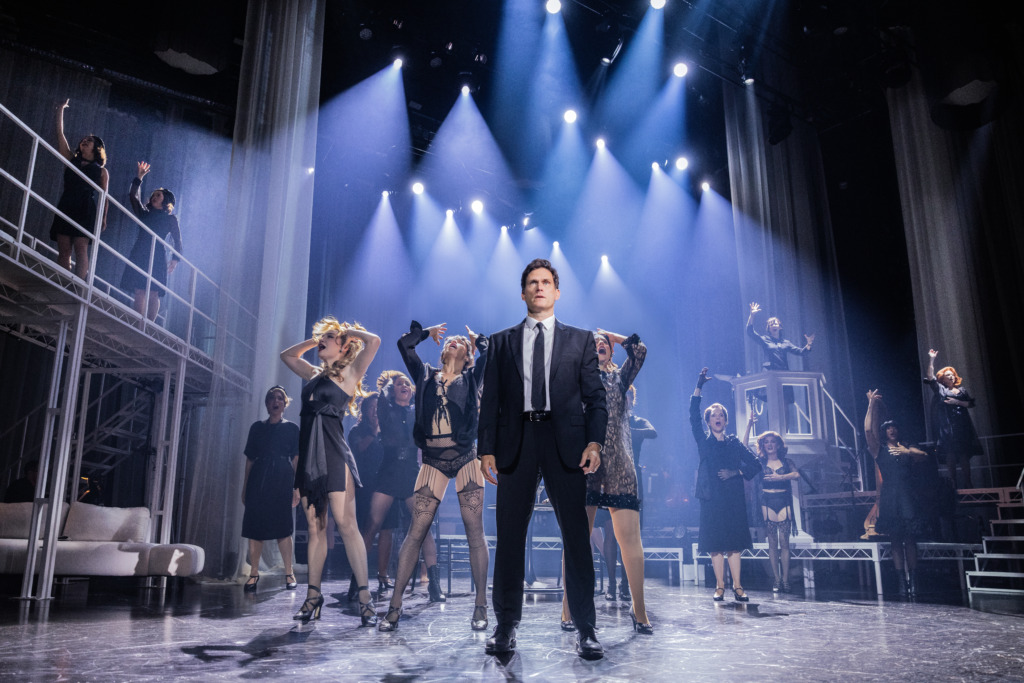
With a stark monochrome aesthetic, the gauzy white curtains that drip onto the set from above create the illusion that this show is happening inside of Guido Contini’s mind. Scenic Designer Derek McLane, working in tandem with Lighting Designer Cory Pattak, gives minimal realism and realistic minimalism and yet the stage almost hints at notions of claustrophobia without ever looking cramped. It’s the masterful concept that the experience of Nine is the world inside Guido Contini’s psyche, as opposed to reality and it is a stunning display from both McLane and Pattak, all aligning with Blankenbuehler’s overall vision for the performance. Having the live 20+ orchestra on stage, a signature feature of any Broadway Center Stage show, enhances this concept, suggesting that the music can only be heard inside Guido’s head.
The orchestra, led by conductor Lily Ling (though often there are moments where the women of Guido’s life and even Young Guido appear to be ‘conducting’ the concerto, which again gives layers of authenticity to this concept that the entire production experience is only existing inside of Guido Contini’s mind) is lush, truly sensational, and brings the stirring music of Maury Yeston to rich, vivacious life. Featuring Ashley Booher, Stephani Stang-Ferry, Emily Tsai, Matt Belzer, and Keith Daudelin on reeds, Wei-Ping Chou and Robert Odmark on horn, Fred Irby III and Josh Kauffman on trumpet, Katie Franke and Katie Thigpen on trombone, Jonathan Rance on percussion, Joe Connell on drums, Oleg Rylatko (concertmaster), Martha Kaufman, and Timothy Macek on violin, Philippe Chao and Elizabeth Pulju-Owen on viola, Ignacio Alcover and Igor Zubkovsky on cello, Robert D’Imperio on bass, and Patrick Fanning on keyboard— this orchestral experience is magnificent, pulling deep swells of emotion fro Yeston’s score, highlighting moments of real passion, true turmoil, and mental chaos every step of Guido’s journey.
Sartorially speaking, the costumes are exquisite. Costume Designer Alejo Vietti fabricates glorious dresses for the 18 women featured in this production. (What can you honestly say about Guido and Young Guido’s outfits? They get crisp suits and suspenders, respectively and they look lovely but are certainly not the sparkling radiance that all of Vietti’s other designs are.) All black. All lacy, seductive, suggestive, or prim and demure. Except for the one jaw-dropping flip-costume that gets featured on the Liliane La Fleur character; that stunning red spectacle is extravagantly opulent; decadence beyond compare and truly puts the glitzy flash of how Guido perceives her in that moment into perspective. The tatty, almost seaweed like draping of Sarraghina’s costume gives you the sense of the ‘naughty docks’ near St. Sebastian while the more primly fitted suit-dress featured on Luisa shows you how Guido configures his wife into his fantastical version of reality. The same is true for Claudia, who has a shimmering scarf-style attachment to her dress, alluding to the ephemeral and ethereal role that she plays in his life. Never truly tangible but sparkling brightly just before his eyes.
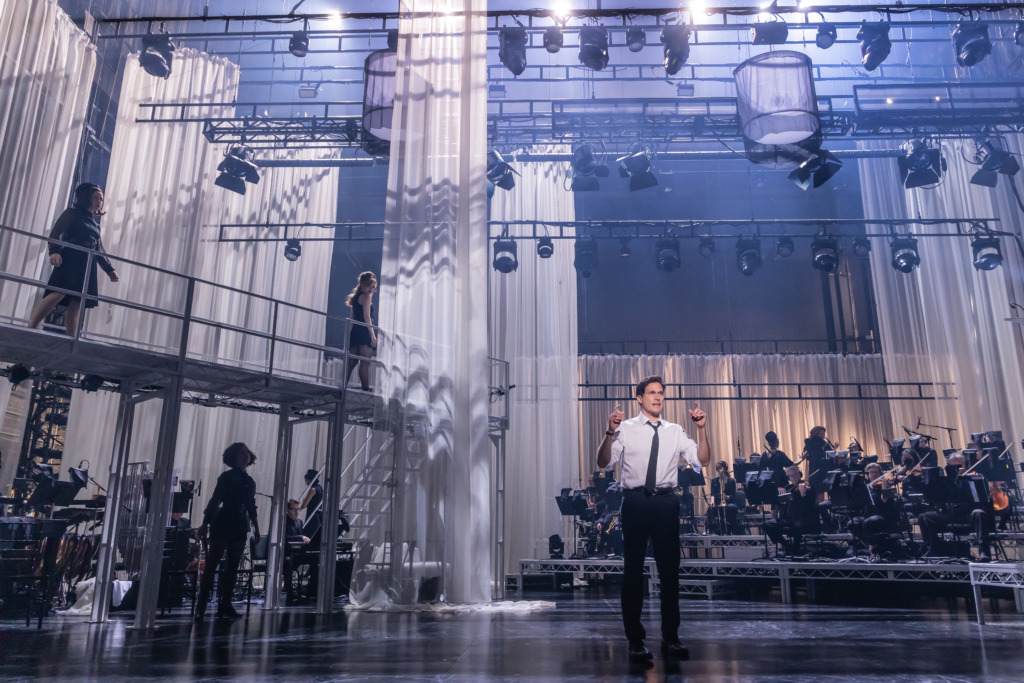
What makes this production truly spectacular, in addition to the sensational orchestra, the pleasing aesthetics, and the astonishing talent packed into a cast of 20, is Andy Blankenbuehler’s evocative choreography and overall vision for the production. Movement and blocking ebb and flow seamlessly with the actual dance routines of the show, with bodies of the named ensemble (Haley Fish, Georgina Pazcoguin, Allison Blackwell, Paloma Garcia-Lee, Marina Pires, Lucia Giannetta, Yani Marin, Morgan Marcell, Kamille Upshaw, Dylis Croman) floating, drifting, flitting, and flickering through these carefully choreographed numbers as if they were living being and simultaneously shadows of Guido’s past and shades of his future. Their movements are graceful and fluid, even when staccato and jarring. It’s mesmerizing, particularly when they lace and twine themselves around Guido, whirling and twirling as if they themselves were threads of his memory, flickering before his very eyes. There’s rhythm and nuance that informs Blankenbuehler’s choreography, particularly during “Be Italian” and “Folies Bergères.” Finding 18 women who can blend together as one ubiquitous woman— an every-woman— and yet be an individual simultaneously is no easy feat but it is one that Blankenbuehler has achieved with great success. Blankenbuehler creates a theatrical feast with his concept, visually stunning, sensually evocative, emotionally gutting at times; it’s a profoundly dizzying, disarming experience that should not be missed.
Often scooting into scenes underfoot, Little Guido (Charlie Firlik) is quite precious to behold on stage. You don’t get a proper taste of his vocal capabilities until the second act, but his voice is delightful when singing his solo, “Getting Tall” and his overall demeanor is sweet and loaded with the nine-year-old innocence expected of the character. The way Firlik interacts with Guido (Steven Pasquale) is both intriguing and endearing; you get the sense that Pasquale’s Guido is replaying a memory living in live-time, while Firlik’s youth is staring at the potential of what his future could someday be, without all of the darkness and mental imbalance that later befalls Guido Contini. Watch Firlik carefully during “Be Italian”, the way Blankenbuehler handles the blocking and interactions of Sarraghina with Guido and Little Guido is brilliant so that the implications are still clear. Firlik is constantly zipping around the set, and his interactions with Lilian La Fleur are pricelessly charming, much in the same vein that his interactions with Guido’s Mother are loving and tender.
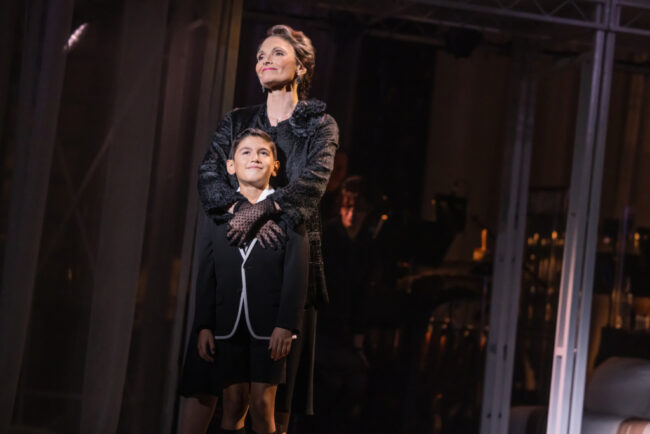
Speaking of Guido’s Mother, Mary Elizabeth Mastrantonio brings this becalmed matronly presence to the stage with effortless ease. Though she is not without her humor, particularly when Mastrantonio’s character appears to Guido near the end of the performance, clucking on about death and the terrible film, there is a balance to her presence whenever she is on stage. The way Mastrantonio dotes upon young Guido, even when chastising him, feels pure and authentic. The deep concern that she brings to her clipped discussion with Luisa feels driven from a place of true Catholic guilt. Her voice is heavenly when singing “Nine.”
With a searing soprano sound, Jen Sese makes you take note of the Stephanie Necrophorus character, even though she feels to be the least tied-in to the narrative of Guido’s experience. A critic, an opinion-haver, but there all the same. Her voice is featured resplendently during several of the numbers, most notably— “Folies Bergères.” Alternatively, Asa Nisi Masa (Sasha Hutchings) is another loose-thread in Guido’s world that is seemingly omnipresent yet not truly a force in his reality. (You can go delving down the origin-rabbit-hole for the namesake if you like but in this particular production she seems to be more of an everywoman-soul.) Spirited and ever-present, like so many of the women, she seems to lurk perpetually more so than the others. If Guido’s mother looks on from the white scaffolding like an angel, Hutchings’ Asa Nisi Masa creeps at ground level like a demon or a spy.
Claudia (Shereen Ahmed) is the impossible dream for Guido. All of the women in the performance, whose accents are meant to be Italian (or in some cases French and slightly English) have flawlessly delivered accents, Ahmed being no exception to this stunning detail. “Only With You” showcases Ahmed’s delicate-dreamlike existence, as Guido perceives her to be. You get this harrowing and humbling tell of her existence at the end, when she tells him of her life and what reality actually is as opposed to how he pictures it. Ahmed’s voice is striking, almost eerie in the way it haunts through her duet with Guido at the top of Act II, “A Man Like You/Unusual Way” and you can feel the way her heart is sobbing into this song, all of the vexing emotions flowing freely into her lyrical sound.
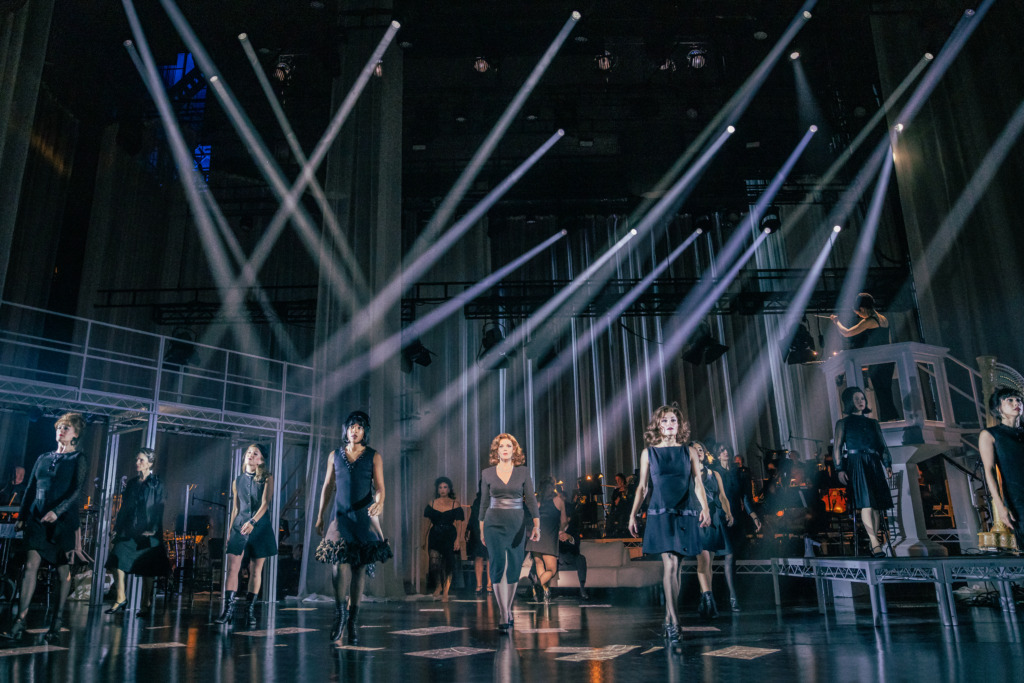
Squeaky, cheeky, and one enormous tease, Michelle Veintimilla’s Carla is as adorable as she is insistent, if adorable covers the myriad of sins that are naughty, vixenous, and flirtatious. There is a polished refinement to her lust for Guido and the way she tosses herself about in the gossamer sheet-curtain (draping and flow-falling from above) during “A Call From the Vatican” is simply exquisite. Showcasing a dueling dynamism, Veintimilla showcases a rich depth to the Carla character by the time she reaches her exit in “Simple” at the end of the second Act. Flirtatious and buoyant though her character’s ambitious seemed in the first half of the performance, you get the sense of total heartbreak and soul crushing annihilation by the time she sings this solo.
With a roof-blasting belt during “Be On Your Own” and the superior dignity with which she marches, head held high, storming proudly but slowly despite tears in her eyes out through the audience as “Be On Your Own” concludes, Elizabeth Stanley’s portrayal of Luisa— Guido’s Wife— is remarkable beyond compare. Up against knowing of the mistress Carla, knowing of the pipedream Claudia, up against learning of his past from Guido’s Mother, and all of the antics that come along with her filmmaker husband, Stanley’s Luisa is pure expression of statuary patience and the living definition of ‘stand by your man’ particularly when she sings with her rich Italian accented affectation during “My Husband Makes Movies.” She’s singing from her soul and yet the creeping self-doubt of attempting to convince herself of these truths she’s espousing is never far from the surface of her song.
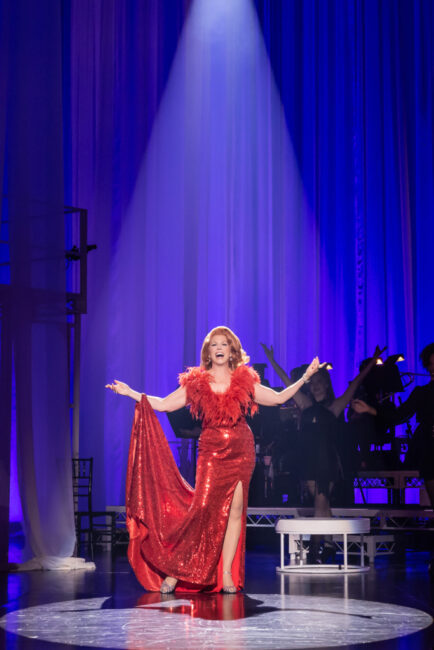
In a bombastic category all her own, Lilian La Fleur (Carolee Carmello) is a fiery and ferocious woman that storms into the spa in Venice ready to bulldoze her way through the brickwork in an attempt to find Guido Contini and exact exactly what it is she expects from him. Hot-blooded, hot-tempered, and full of vigorous expressions, Carmello is fierce and fantastically engaging to watch. Her comedic timing is brilliant and although she reads as a heightened caricature of a producer-type, she is one of the more realistic interruptions in Guido’s fantasy world. With one sensational number that takes up a good 15-minutes of stage time (if not more), wherein she blows through the fourth wall, though not before making a dazzling, jaw-dropping-on-stage costume flip, and slinks her way down into the house for some blurry-lined interactions with the audience. Carmello has the entire house (and everyone on stage once gets back up on stage) eating out of her palm for “Folies Bergères.” With powerhouse vocals that match her spicy and fiery personality, she engages the entire company, leading them through that number with gusto and volcanic-vigor.
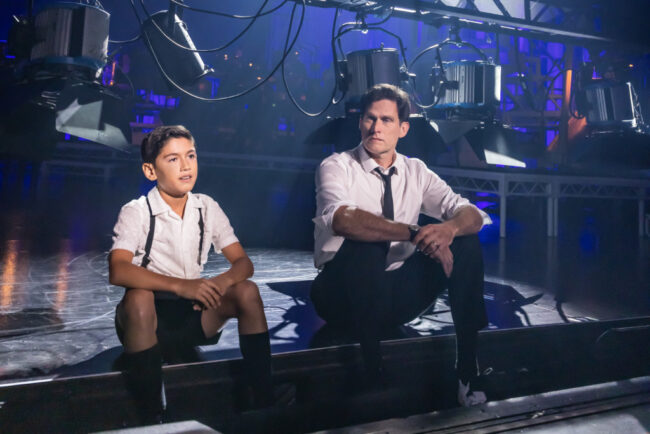
In a show about one man, where being the only man (younger version of himself not included) in the performance, Steven Pasquale has his work cut out for him, taking up the mantle of Guido Contini. His comic timing is effortless, his panicked and erratic delivery divine. His operatic singing voice is superb, heart-melting, loin-shivering, soul-shattering, and all of the great many other descriptors that you expect from someone of his stage pedigree. Pasquale deftly displays the perpetually frenetic emotional turmoil that Guido experiences inside his head, which ultimately bleeds out into and colors his reality. It’s wild watching him bend his body about as the various women of the show wend their ways around him. Each interaction he has with these women is unique and yet somehow the same; it’s an extraordinarily curious concept to watch unfold. The way he caresses Luisa or sings at Claudia, cries at his mother, shies away from Sarraghina; all unique yet similar. His patter numbers are delivered at an exceptional pace and you never once miss a lyric. His heart and soul soar through “I Can’t Make This Movie” and the panicked meltdown that he portrays during “Grand Canal” is so edgy you feel tingles of discomfort starting to ride slowly up your spine. His voice, his performance, his overall expression of Guido Contini is perfection for this production. The way he leads the company through the harrowing and tragically beautiful rendition of “The Bells of St. Sebastian” is enough to shake you through to your core.
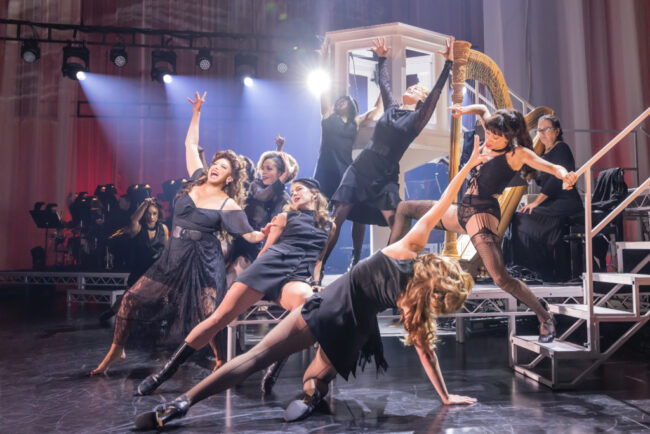
Sarraghina (Lesli Margherita) steals the show. Bawdy, gritty, salty-sea-sand of the earth, this madam of the night, this prostitute of the docks, this roaring rapscallion is so much more than just the naughty enchantress tasked with singing “Be Italian.” She’s vocally salty, physically bawdy, and yet darkly charming. It’s indescribably brilliant. And Margherita’s voice is earthshaking. Her saucy movements all through this number are done with more than just her body; her spirit and voice are moving as one to entice, to corrupt, to please— and watching the way both Guido and Little Guido take it all in, absorbing like a completely blindsided sponge is just delicious. Raunchy and wild and toeing the line of what’s suitable for the stage, Margherita slays this number and wins herself and the company a gloriously well-deserved ovation at its conclusion.
How can you ever forget seeing this production of Nine; it will touch your soul in its most unusual way. Limited engagement through August 11th, 2024; do not miss this exquisite, extraordinary rare-gem of a production.
Running Time: 2 hours and 15 minutes with one intermission
Nine plays through August 11th 2024 as a part of the Broadway Center Stage series in the Eisenhower Theatre at The John F. Kennedy Center for the Performing Arts, 2700 F Street NW, Washington, DC. For tickets call the box office at (202) 467-4600 or purchase them online.
